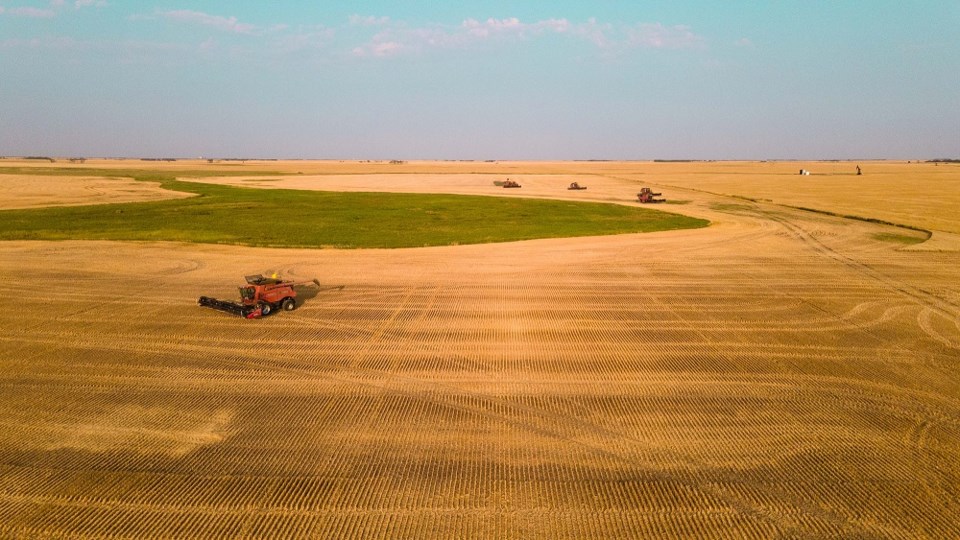Harvest operations have begun throughout the province and three per cent of the crop is now combined, well ahead of the five-year average (2016-2020) of less than one percent harvested for this time of year. Another three per cent of the crop in the province is ready to straight combine and that number will quickly rise as crops are rapidly drying down from the heat.
There was minimal rainfall throughout the province this past week, with many areas receiving none. The Macklin area received the most rainfall this week with 18 mm. The Marquis area received 16 mm, the Cabri area 14 mm and the Allan area 11 mm. This rain will do little for the crop this year, but will help the soil moisture going into the fall and hopefully carry over to next year. A large portion of the province has not received a significant rainfall since the beginning of June.
Minimal rain and hot temperatures this past week have resulted in a reduction in provincial topsoil moisture. Cropland topsoil moisture is rated as three per cent adequate, 31 per cent short and 66 per cent very short. Hay and pasture land topsoil moisture is rated as two per cent adequate, 25 per cent short and 73 per cent very short.
Hot, dry conditions have resulted in reduced pasture growth in many areas. Provincially, pasture conditions are rated as 19 per cent fair, 35 per cent poor and 46 per cent very poor.
The majority of crop damage this week was due to heat, drought stress and wind. Some areas of the province saw some hail storms that varied in intensity and duration, with some minor damage occurring. Grasshoppers are still an issue in many parts of the province but most producers are unable to deal with them now that harvest has started. They hope to get the crop off before too much more damage is done.
Due to the extremely dry conditions of fields and harvested plant material, producers are С����Ƶ extra vigilant for any signs of combine fires or field fires that may be created during their harvest activities.
Producers are busy wrapping up their haying operations, hauling water to cattle on pasture and getting ready for harvest.
Producers are reminded that in response to the feed shortage this year, Saskatchewan Crop Insurance Corporation is doubling the Low Yield Appraisal threshold values for customers who salvage their cereal or pulse crops as feed, without negatively impacting future individual coverage. Customers are asked to contact their local SCIC office before they graze, bale or silage any damaged crops to discuss their options. Additionally, the Government of Saskatchewan is making changes to temporarily increase the maximum funding a livestock producer can receive from the Farm and Ranch Water Infrastructure Program (FRWIP) for dugouts, wells and pipelines for agricultural use. This change will be in effect for the April 1, 2021 to March 31, 2022, time period. The maximum rebate for livestock producers during this time period will increase from $50,000 to $150,000. The first $50,000 will be based on a 50-50 cost-share and the remaining $100,000 will be on a 70-30 government-producer cost-share. Producers can contact the Agriculture Knowledge Centre at 1-866-457-2377 for more information.
The federal and provincial governments have increased the 2021 AgriStability interim benefit payment percentage from 50 per cent to 75 per cent for Saskatchewan producers. The interim benefit provides the opportunity for producers who are enrolled in AgriStability to access a portion of their benefit early, to help support losses and cover costs. With this increase, Saskatchewan producers can apply for an interim benefit to receive 75 per cent of their estimated final 2021 benefit, before completing their program year. To apply for an interim benefit, producers can contact their local SCIC office, call the AgriStability Call Centre toll-free at 1-886-270-8450, or email [email protected].
We would like to also remind producers that the Farm Stress Line is available for support if you need it. It is a confidential service, available 24-hours-a-day, seven-days-a-week, toll-free at 1-800-667-4442. Calls are answered by Mobile Crisis Services Regina, a non-profit, community-based agency and there is no call display.
A complete, printable version of the Crop Report is available online at .
Follow the 2021 Crop Report on Twitter at @SKAgriculture.




